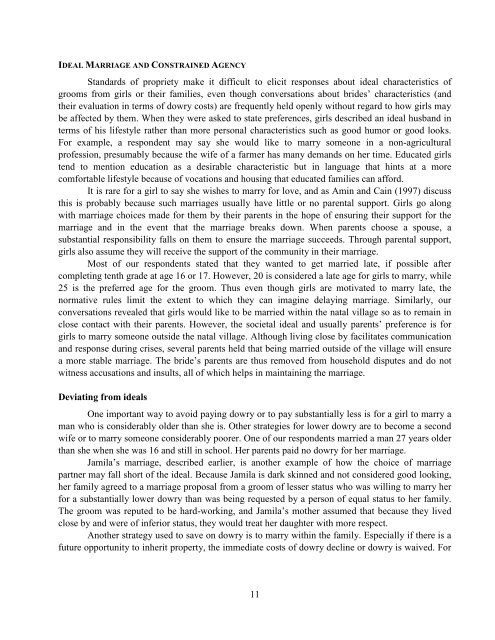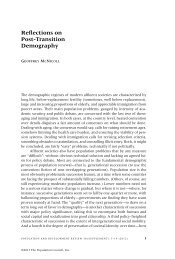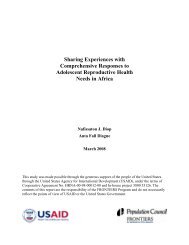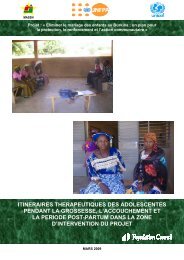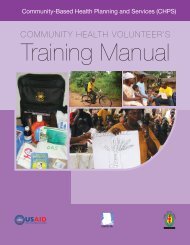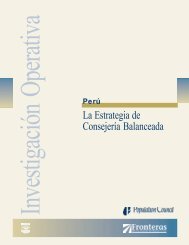Marriage Considerations in Sending Girls to School in Bangladesh ...
Marriage Considerations in Sending Girls to School in Bangladesh ...
Marriage Considerations in Sending Girls to School in Bangladesh ...
You also want an ePaper? Increase the reach of your titles
YUMPU automatically turns print PDFs into web optimized ePapers that Google loves.
IDEAL MARRIAGE AND CONSTRAINED AGENCY<br />
Standards of propriety make it difficult <strong>to</strong> elicit responses about ideal characteristics of<br />
grooms from girls or their families, even though conversations about brides‘ characteristics (and<br />
their evaluation <strong>in</strong> terms of dowry costs) are frequently held openly without regard <strong>to</strong> how girls may<br />
be affected by them. When they were asked <strong>to</strong> state preferences, girls described an ideal husband <strong>in</strong><br />
terms of his lifestyle rather than more personal characteristics such as good humor or good looks.<br />
For example, a respondent may say she would like <strong>to</strong> marry someone <strong>in</strong> a non-agricultural<br />
profession, presumably because the wife of a farmer has many demands on her time. Educated girls<br />
tend <strong>to</strong> mention education as a desirable characteristic but <strong>in</strong> language that h<strong>in</strong>ts at a more<br />
comfortable lifestyle because of vocations and hous<strong>in</strong>g that educated families can afford.<br />
It is rare for a girl <strong>to</strong> say she wishes <strong>to</strong> marry for love, and as Am<strong>in</strong> and Ca<strong>in</strong> (1997) discuss<br />
this is probably because such marriages usually have little or no parental support. <strong>Girls</strong> go along<br />
with marriage choices made for them by their parents <strong>in</strong> the hope of ensur<strong>in</strong>g their support for the<br />
marriage and <strong>in</strong> the event that the marriage breaks down. When parents choose a spouse, a<br />
substantial responsibility falls on them <strong>to</strong> ensure the marriage succeeds. Through parental support,<br />
girls also assume they will receive the support of the community <strong>in</strong> their marriage.<br />
Most of our respondents stated that they wanted <strong>to</strong> get married late, if possible after<br />
complet<strong>in</strong>g tenth grade at age 16 or 17. However, 20 is considered a late age for girls <strong>to</strong> marry, while<br />
25 is the preferred age for the groom. Thus even though girls are motivated <strong>to</strong> marry late, the<br />
normative rules limit the extent <strong>to</strong> which they can imag<strong>in</strong>e delay<strong>in</strong>g marriage. Similarly, our<br />
conversations revealed that girls would like <strong>to</strong> be married with<strong>in</strong> the natal village so as <strong>to</strong> rema<strong>in</strong> <strong>in</strong><br />
close contact with their parents. However, the societal ideal and usually parents‘ preference is for<br />
girls <strong>to</strong> marry someone outside the natal village. Although liv<strong>in</strong>g close by facilitates communication<br />
and response dur<strong>in</strong>g crises, several parents held that be<strong>in</strong>g married outside of the village will ensure<br />
a more stable marriage. The bride‘s parents are thus removed from household disputes and do not<br />
witness accusations and <strong>in</strong>sults, all of which helps <strong>in</strong> ma<strong>in</strong>ta<strong>in</strong><strong>in</strong>g the marriage.<br />
Deviat<strong>in</strong>g from ideals<br />
One important way <strong>to</strong> avoid pay<strong>in</strong>g dowry or <strong>to</strong> pay substantially less is for a girl <strong>to</strong> marry a<br />
man who is considerably older than she is. Other strategies for lower dowry are <strong>to</strong> become a second<br />
wife or <strong>to</strong> marry someone considerably poorer. One of our respondents married a man 27 years older<br />
than she when she was 16 and still <strong>in</strong> school. Her parents paid no dowry for her marriage.<br />
Jamila‘s marriage, described earlier, is another example of how the choice of marriage<br />
partner may fall short of the ideal. Because Jamila is dark sk<strong>in</strong>ned and not considered good look<strong>in</strong>g,<br />
her family agreed <strong>to</strong> a marriage proposal from a groom of lesser status who was will<strong>in</strong>g <strong>to</strong> marry her<br />
for a substantially lower dowry than was be<strong>in</strong>g requested by a person of equal status <strong>to</strong> her family.<br />
The groom was reputed <strong>to</strong> be hard-work<strong>in</strong>g, and Jamila‘s mother assumed that because they lived<br />
close by and were of <strong>in</strong>ferior status, they would treat her daughter with more respect.<br />
Another strategy used <strong>to</strong> save on dowry is <strong>to</strong> marry with<strong>in</strong> the family. Especially if there is a<br />
future opportunity <strong>to</strong> <strong>in</strong>herit property, the immediate costs of dowry decl<strong>in</strong>e or dowry is waived. For<br />
11


